-
开放科学(资源服务)标志码(OSID):

-
农村水污染是我国目前面临的一个严峻问题,相比城市污水处理,农村污水处理存在污染源多且污染源分散的问题,形成了排放高、处理难的现象,未经处理的污水排放入农村天然水体中导致水质恶化,对生态环境造成极大的危害[1]. 1993年Wakatsuki等[2]使用多介质土壤层(Multi-Soil-Layering System,MSL)渗滤系统来处理污水,系统由通水层(PL)和土壤混合层(SML)组成,通水层由粒径较大的填料组成,土壤混合层由土壤与当地废弃物混合组成. MSL系统具有低成本、低能耗、环保、易管理的优点,适宜我国农村地区分散型的污水处理模式[3].
传统的MSL系统在农村地区的实际工程应用存在诸多问题,Latrach等[4]通过示踪实验发现,传统MSL系统在运行时其系统内部存在死区,填料利用率低,影响MSL系统的处理效率. 程铭[5]通过实验比较了人工湿地季节变化对COD,NH3-N,TN,TP去除效果的影响,得到结论为夏季的处理效果最佳,冬季处理效果最差,且冬季处理效果仅为夏季的1/3. 吴浩恩等[6]通过监测环境温度的变化来探究进水温度对MSL系统脱氮效果的影响,当环境平均温度由19 ℃下降到15 ℃以下时,MSL系统对NH3-N和TN的去除效果分别下降了10%和17%,其原因在于低温条件下系统内硝化菌和反硝化菌活性降低,从而影响硝化和反硝化反应过程,冬季污水脱氮效果能否达到排放标准便成为了农村污水处理的一大难题. 本研究在传统MSL系统的基础上对其滤料和装置结构进行优化,将4个MSL过滤单元以连通器的形成连接组成四级MSL系统,系统内部形成多个“好氧—厌氧”区域并加入稻壳炭作为反硝化反应的碳源,运行期间对四级MSL系统出水的COD,NH3-N,TN,TP浓度进行监测. 结果表明,四级MSL系统能够有效解决传统MSL系统在低温环境下(<15 ℃)对TN去除效率低的问题,同时解决MSL系统占地面积大、不便维护等实际应用问题,能够为今后相关研究以及该设备的推广使用提供参考.
HTML
-
如图 1所示,实验装置由储水部分、油污分离部分和四级土壤渗滤系统组成. 系统所用管件为直径110 mm的PVC管,管件之间以连通器的模式连接. 油污分离部分管件高度90 cm,无滤料填充,在距离底部45 cm位置设置排油口. 四级MSL系统管件高度均为50 cm,滤料填充高度为35 cm,底部和顶部用砾石(粒径范围5~10 mm)填充防止系统堵塞,填充高度分别为10 cm和5 cm,中部滤料采用分层填充(单层层高5 cm,共分7层),由下至上为土壤混合层与通水层交替填充,其中1,3,5,7层为土壤混合层,2,4,6层为沸石通水层. 实验所用沸石(粒径范围3~5 mm)购自河南弘之源净水材料有限公司,土壤混合层由紫色土(重庆地区典型的紫色土土壤,有机质含量9.25 g/kg)、铁屑(购自重庆北碚机械加工厂)和生物炭(实验采用稻壳生物炭)按照8∶1∶1的质量比混合制成. 在四级MSL系统的第二、三级连通管和系统末端设置有两个排水口,分别命名为排水口A、排水口B.
-
侯京卫等[7]调研汇总了我国部分农村地区的生活污水排放量和污染物浓度,其中COD,TN,TP的平均值分别为386.4,50.5,3.7 mg/L. 本实验采用模拟生活污水进行试验,配置方法:50 g葡萄糖,20 g淀粉,22 g NH4Cl,1.2 g KH2PO4,1.6 g K2HPO4,1.5 g蛋白胨加水稀释至100 L,配置所得模拟污水的水质指标见表 1.
-
系统自2018年11月开始运行至2019年2月,监测期间处于冬季,环境温度4~15 ℃,进水水温处于偏低水平(<15 ℃). 实验采用间歇式进水的方式,控制系统表面水力负荷在1 000 L/(m2·d),对取样污水中COD,NH3-N,TN,TP的测定方法见表 2,参考《水和废水监测分析方法》(第4版)[8].
1.1. 实验装置构建
1.2. 实验污水水质
1.3. 实验运行方法
-
四级MSL系统实验分为两个阶段. 第一阶段为挂膜启动阶段,期间采用连续进水的方式,监测出水水质. 在连续进水25 d后可以观察到原本光滑的沸石填料和土壤混合层表面被一些生物絮体覆盖,填料表面颜色变为土褐色,相邻两次监测出水水质指标偏差不高于20%[9],此时系统污水处理效果趋于稳定,系统挂膜成功. 第二阶段为运行阶段,期间控制进水水力负荷在1 000 L/(m2·d),连续监测46 d. 监测期间从排水口A、排水口B取样,对应污染物浓度分别记为Mid浓度、Final浓度,监测结果见图 3,对应去除率见图 4.
-
四级MSL系统对有机物的去除主要依靠系统内基质的吸附和异养型好氧微生物的代谢分解,污水中的有机物首先被吸附在土壤混合层内部和沸石表面,随后在好氧细菌作用下被降解[4]. 监测期间进水COD平均质量浓度为353.16 mg/L,由图 3、图 4可知,排水口A、排水口B出水的平均质量浓度为173.47 mg/L和85.24 mg/L,系统对COD的平均去除率为75.89%. 出水COD浓度满足GB 18918-2002《城镇污水处理厂污染物排放标准》中的二级标准(≤100 mg/L),去除率满足标准规定的范围值(进水COD浓度>350mg/L时,去除率应大于60%). 四级MSL系统在相同水力负荷条件下比传统MSL系统对COD的去除率提升了10.69%[10],这说明连通器结构的四级MSL系统通过减小径流截面面积、增加沿程距离提高了系统内填料的有效体积和利用率,减少了内部死区[4],使系统在低温条件下运行也保持较好的COD去除效果. 由图 3可观察到从第34天开始,排水口A、B出水COD浓度出现了小幅同步上升,这一现象出现的原因是期间环境温度的降低使得系统中的好氧细菌活性下降,有机物分解速率减慢,基质中截留的有机物颗粒没能被及时分解,导致系统对COD的去除率下降.
-
由图 3、图 4可知,NH3-N平均进水质量浓度为49.87 mg/L,排水口A、B的出水NH3-N的平均质量浓度分别为25.3 mg/L和14.2 mg/L,平均去除率为49.07%和71.43%,排水口B出水满足GB 18918-2002《城镇污水处理厂污染物排放标准》中的一级B标准(≤15 mg/L). 四级MSL系统对NH3-N的去除主要通过填料吸附和系统内部硝化反应,其中沸石起主要作用. 沸石结构特点为高孔隙率和较大的比表面积,是微生物的良好载体[10]. 沸石上吸附的NH4+-N由亚硝酸菌和硝酸菌的协同作用将氨氮转化为亚硝态氮、硝态氮[11],其中亚硝酸菌和硝酸菌为好氧自养菌,反应过程见式(1)、式(2).
4个过滤单元以连通器的形式串联连接,使污水和基质的接触相较于传统MSL系统更充分,但低温环境下硝化细菌的活性受到影响,氨氮和硝态氮之间的转化过程变慢,导致NH3-N的出水质量浓度未能达到一级A标准.
-
由图 3、图 4可知,监测期间进水TN的平均质量浓度为62.47 mg/L,排水口A、B的出水TN的平均质量浓度分别为34.96 mg/L和19.61 mg/L,出水平均去除率达到68.59%,出水水质满足GB 18918-2002《城镇污水处理厂污染物排放标准》中的一级B标准(≤20 mg/L),相较于两段式MSL系统效果提升了17.37%[12]. TN的去除主要是在缺氧条件下进行,系统中的硝态氮在反硝化细菌的作用下,以硝酸盐氮为电子受体,以有机物为电子供体进行厌氧呼吸,将硝酸盐氮还原为N2O和N2从系统中去除[13]. 冬季MSL系统对TN去除效果差原因在于低温使得系统中的硝化反应减弱,参与硝化反应的硝态氮的含量降低,减弱了反硝化反应. 四级MSL系统将MSL渗滤单元通过连通器的形式连接在一起,当污水进入时会淹没装置内部,这种淹没式出水能够在MSL渗滤单元底部营造出较好的厌氧环境,在结构上相比两段式MSL系统更利于反硝化反应的进行.
-
水质监测期间系统进水TP的平均质量浓度为3.56 mg/L,排水口A和排水口B的出水TP平均质量浓度分别为1.24 mg/L和0.45 mg/L,TP的平均去除率分别为63.50%和86.69%. 出水满足GB 18918-2002《城镇污水处理厂污染物排放标准》中的一级A标准(≤0.5 mg/L).
四级MSL系统内部对TP的去除主要是通过系统内部基质的吸附作用,土壤混合层(SML)中存在Fe2+、Al3+、Ca2+等金属离子,离子在SML中析出形成土壤胶体颗粒,与污水中的磷酸根离子结合形成胶体沉淀. 在SML中加入铁屑有助于基质对TP的吸附,其作用过程为铁屑在SML中被废水溶解为Fe2+,随污水由相对厌氧区间(SML)流入相对好氧区间(PL),在PL的好氧条件下被氧化为Fe3+,与水中的OH-结合形成Fe(OH)3胶体,吸附固定污水中的磷酸根离子实现对TP的去除[13]. 整个吸附过程受温度的影响较小,故在低温条件下运行时该系统对TP仍能取得较好的去除效果.
-
农村生活污水排放呈现间歇性,日变化系数高,水质具有波动性,污水的处理设施和技术应具有一定的抵抗冲击负荷能力来适应处理负荷的突然增加且不对系统造成破坏. 四级MSL系统稳定运行期间保持负荷为1 000 L/(m2·d),在1 d的14:00到17:00增加进水的表面水力负荷到2 000 L/(m2·d),之后将该系统的运行负荷降至1 000 L/(m2·d). 在系统运行过程中选取的水样取样时间分别为10:00,12:00,14:00,15:30,17:00,19:00,21:00,对取样污水进行污染物浓度测定,结果如图 5所示.
四级MSL系统在表面水力负荷从1 000 L/(m2·d)增加到2 000 L/(m2·d)的过程中,出水的COD,NH3-N,TN,TP浓度均明显升高,当水力负荷重新恢复到1 000 L/(m2·d)时,系统出水中各污染物的浓度恢复到稳定运行的水平. 可见,在高水力负荷的条件下系统对污染物的去除率会下降,短时间的冲击负荷不会对系统造成破坏,当系统的负荷恢复初始水平时,系统对污染物的去除率也能够恢复到初始水平. 实验过程未出现系统堵塞现象,实验结束后观察内部未出现结构崩坏现象,说明系统在冲击负荷作用下运行具有稳定性.
2.1. 系统运行监测结果
2.2. COD去除效果分析
2.3. NH3-N去除效果分析
2.4. TN去除效果分析
2.5. TP去除效果分析
2.6. 冲击负荷下的系统运行效果
-
1) 四级MSL系统可以实现低温条件下生活污水的有效处理,COD,NH3-N,TN,TP的平均去除率为75.89%,71.43%,68.59%,86.69%,平均出水浓度为85.24,14.2,19.61,0.45 mg/L. 系统出水的TP浓度满足国家《城镇污水处理厂污染物排放标准》(GB18918-2002)中一级A标准,TN和NH3-N浓度满足标准中一级B标准,COD浓度满足标准中二级标准.
2) 四级MSL系统的连通器结构能够有效改善传统MSL系统填料有效体积低、暗流死区占比大的问题,提高填料利用率.
3) 短时间的冲击负荷不会对四级MSL系统造成破坏,当系统的负荷恢复初始水平时,系统对污染物的去除量也能够恢复到初始水平,说明系统在冲击负荷作用下具有一定的稳定性.
4) 四级MSL系统在低温环境的运行研究结果表明,多级土壤渗滤系统处理农村分散型生活污水,既能达到水质处理要求,又具有能耗低、维护和管理方便、费用低等优点,是一种适宜于丘陵山区推广的污水处理工艺.
5) 在后续的实际工程应用中应重点关注该系统的进水动力和运行工况问题,并就MSL系统模块化的应用前景和经济效益展开分析研究.

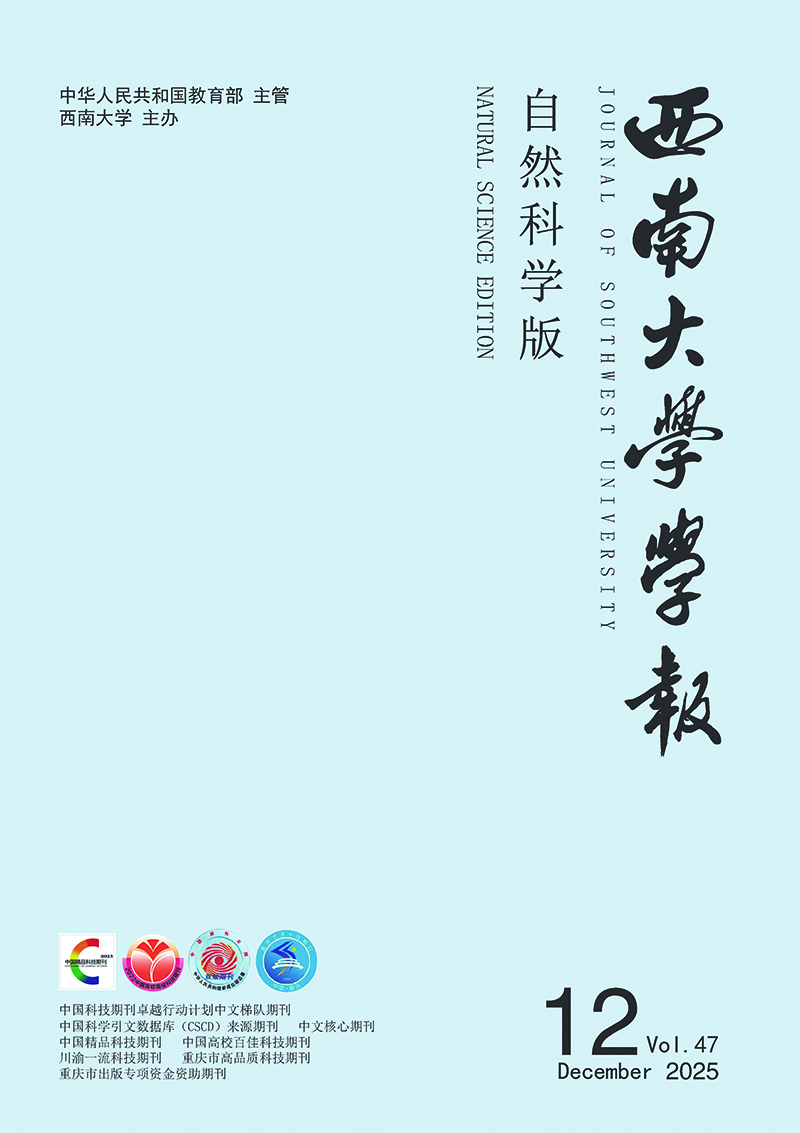


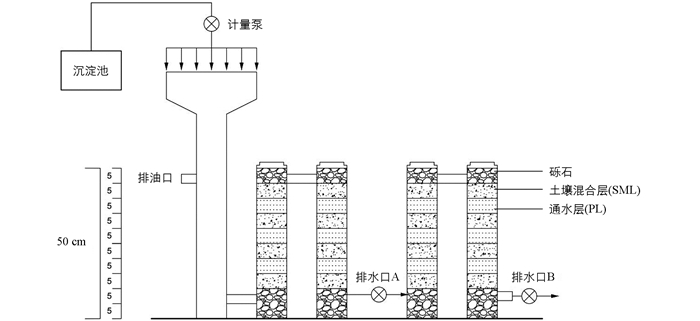


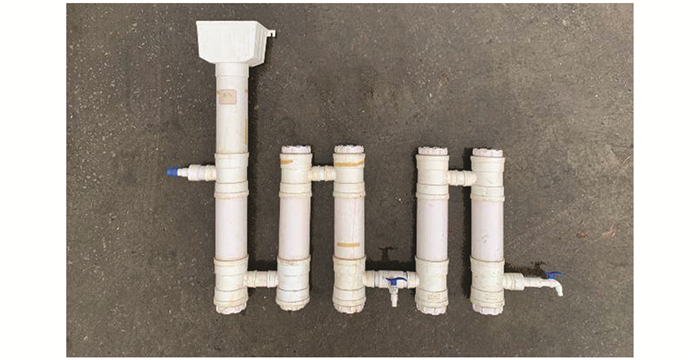
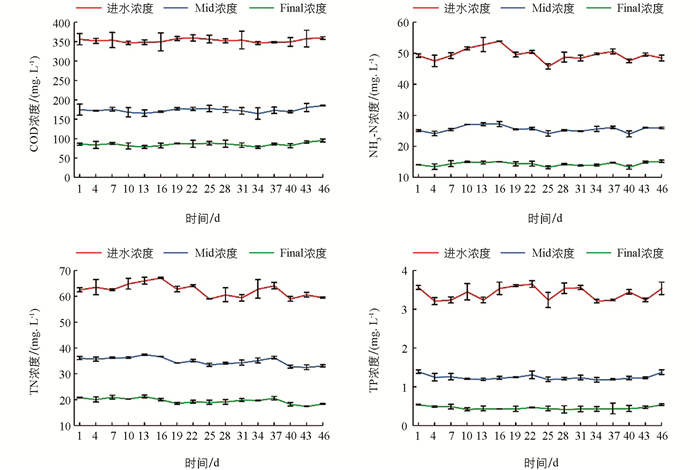
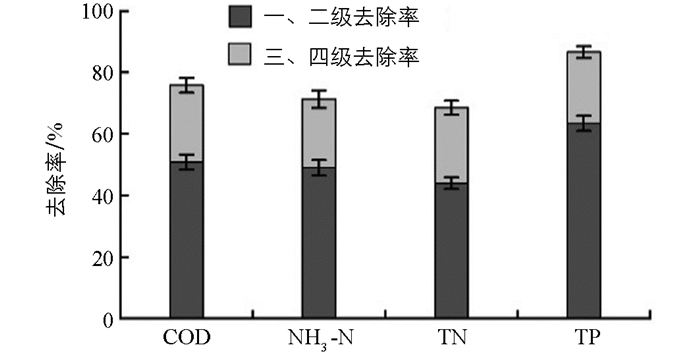

 DownLoad:
DownLoad: